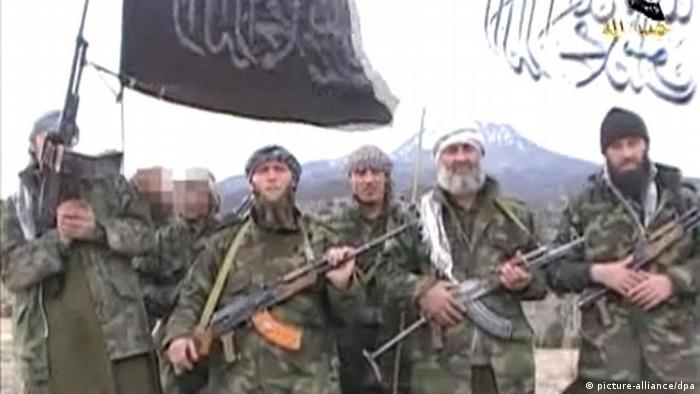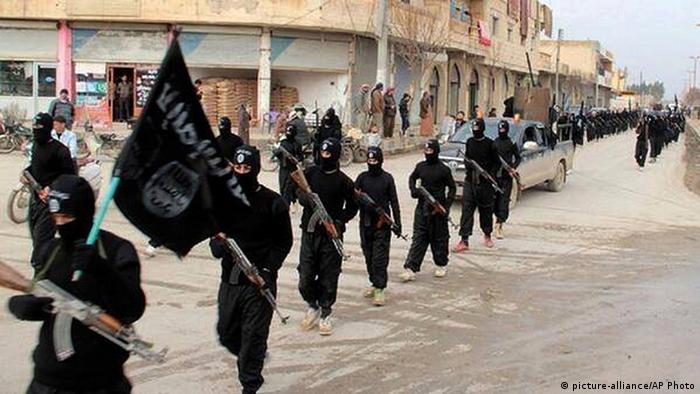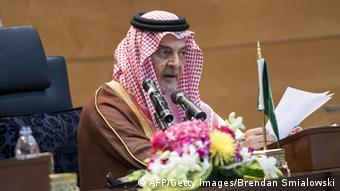Jihadism 'has become a German phenomenon'
German jihadists are participating in the "Islamic State's" war of terror. Security experts fear they could also pose a threat to Germany. Islamic studies scholar Guido Steinberg says political action is needed.
DW: Mr. Steinberg, you are an expert on jihadism, Iraq and Syria and have just written a book on this topic. How deeply rooted do you think the jihad movement is in German society?
Guido Steinberg: In the past few years, jihadism has become a German phenomenon. The perpetrators of 9/11 were Arab students, all of whom came to Germany between 1992 and 1996 to study, but who were influenced by their home country. Since 2006, there has been a steadily growing jihad movement in Germany whose members are without exception sociologically German - that means they have spent a large part of their lives, or grown up, here in Germany. More and more of them were born here. But ethnically, they are quite mixed - many are Turks and Kurds, there are many Arabs from North Africa, but there are also many Germans who have converted to Islam and even a number of Volga Germans in the movement.
What motivates these people? Why is it that they are turning to such an extreme form of Islam?
Since 2006, German jihadists have been going to jihad war zones, first in Pakistan, Afghanistan and some to Somalia, and a few have tried to go to Chechnya. Now for the most part, they are going to Syria and Iraq. Their motivation to help sidelined Sunni Muslims is very strong. There is a second reason they are going, which has become more important in the last few months: these young Salafists want to live in an Islamic society and they believe this is not possible here in Germany nor in Arab countries, but only where jihadists are fighting the so-called enemies of Islam. Add to that more personal reasons, such as the urge to thrill-seek and boredom, and in the past few months it has also become obvious that some simply wish to live out their fantasies of violence.
Do these jihadists really pose a threat to Germany - to the state and society?
Yes, I believe there is a threat. But it shouldn't be exaggerated. We have been living with the phenomenon of German jihadists for eight years now. These are people who receive training from al Qaeda and a number of other organizations to participate in jihad. Most end up returning and a number of them have planned attacks in the past. But at least the attacks planned by those returning from jihad have all failed or been intercepted. The statement you hear frequently - that it is only a question of time before an attack happens here - is nonsense in my opinion. But I do believe it is highly probable that attacks are planned here in Germany.
How well prepared are Germany's security forces and intelligence to counter this danger?
It has become evident over the past few years that German security is dependent upon help from the Americans. There has been at least one case, possibly two, in which plans were able to be foiled because the NSA in the US delivered information. That is an indication of how weak Germany's security services are. I believe that the security services are so weak because German politics want them that way. But considering the growing threat in Germany, I think a different response would be appropriate. We have seen in the past that German security has been very poor in keeping an eye on radicalization. Many terror suspects have been arrested relatively late and with American help. But I would say that this is a problem with the entire structure of security services - a problem with ministerial and also parliamentary oversight.
Which role does Turkey play? Does it support the "Islamic State" (IS) or is it against the group?
Turkey is playing an extremely problematic role, which does not cohere with its status as an ally to most Europeans in NATO. That has to do with priorities in Turkey's Syria policies. First and foremost, Turkey is after two things: it wants to topple the Assad regime - that is the number one goal for Turkey's foreign policy and is also a top personal priority for President Erdogan. The second main objective is containing the Syrian offshoot of the PKK. There are three territories in northern Syria which are governed by Kurds. There, the Democratic Union Party, short PYD, is controlling the current situation. The PYD is nothing other than the Syrian PKK; it is completely intertwined with the militia and monetary threads of the PKK. Turkey has surely developed an interest in containing 'IS,' but that falls far behind the other two priorities. That's why, time and again, we see that an influx of foreign fighters is tolerated in Turkey, which allows weapons to be smuggled across the Turkish-Syrian border.
Two other states have been named in connection with "IS": Saudi Arabia and Qatar. Both have been accused of financing terrorism since the civil war in Syria began.
The biggest problem is, in fact, Turkey. As early as 2011, it started, together with Qatar, supporting Islamist and Salafist and jihadist groups, among them, the Nusra Front, the then Syrian offshoot of 'IS.' Turkey and Qatar have to be blamed for this. But for the past year and a half or so, they seem to be supporting a new partner, the "Free Men of the Levant," or "Ahrar al Sham" in Arabic. This is not a group of jihadists with an international agenda, but a group of Salafists with a more regional agenda. To a certain extent, they are the Syrian Taliban. Whether supporting them is smart politics is questionable. The "Ahrar als Sham" is not on any European blacklists, but in my opinion, it should be, and Turkey and Qatar should be moved to end their dealings with the group immediately.
Saudi Arabia is a bit different. Saudi Arabia has supported the Free Syrian Army (FSA) since 2011. In the end, this is totally compatible with American and European politics. There is absolutely no evidence that the Saudi Arabian state has supported the Nusra Front or the 'IS.' On the contrary, Saudi Arabia has strongly opposed the group for a while and has worked with the Europeans and agrees with many of the Europeans' misgivings about Turkey's position. I believe it is completely wrong to accuse the Saudis of any wrongdoing in this regard. The biggest problem, however, is posed by Kuwait. It is the financial hub for Syrian insurgents in the Gulf region. However, it is not the state that is financing the groups.
Will we have to start talking to Syrian President Bashar al-Assad? Will we have to team up with him to counter "IS" extremists?
I think announcements by the Americans and also the Europeans in recent months have made clear that they accept that Assad will continue to rule part of the country. Personally, I believe we should not go so far as to place our hopes in him and cooperate with him. That is a mistake that the Western community, the Europeans, have made over the years - that they have cooperated with essentially unacceptable dictators.
I would advise Western politicians to avoid doing that if they want to retain any amount of credibility in the region. On the other hand, most states see a much larger threat in 'IS' than in Assad. But I think we shouldn't forget that Assad is responsible for nearly all of the 200,000 deaths incurred in Syria over the past three years and the 'IS' only for a fraction. Both the Assad regime and 'IS' are our enemies and they must both be fought.
Guido Steinberg is an expert in Islamic studies and works at the German Institute for International and Security Affairs (SWP) in Berlin. His area of expertise is politics of the Middle East with an emphasis on the Arabian Peninsula, political Islam and Islamist terrorism. Up to October 2005, Steinberg was an advisor on terrorism for the German Federal Chancellery and has been regularly consulted for terrorist proceedings.






No comments:
Post a Comment